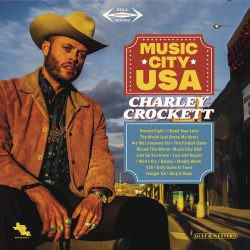Sixteen tracks of smooth retro country make this a must-listen for any fan of the vintage sound.
 ‘Music City USA’ is Charlie Crockett’s 10th album in just six years – and it’s a double one at that – but with the life the 37-year-old Texan has had, it’s of little surprise that he has no shortage of stories to tell. He battled childhood poverty growing up in Dallas, freestyling on the streets of New Orleans as a teenager before busking in New York. Such a transient existence led him to crime, working harvesting marijuana fields in the northwest before he was subsequently twice convicted of a felony.
‘Music City USA’ is Charlie Crockett’s 10th album in just six years – and it’s a double one at that – but with the life the 37-year-old Texan has had, it’s of little surprise that he has no shortage of stories to tell. He battled childhood poverty growing up in Dallas, freestyling on the streets of New Orleans as a teenager before busking in New York. Such a transient existence led him to crime, working harvesting marijuana fields in the northwest before he was subsequently twice convicted of a felony.
Music has very much been Crockett’s saviour, allowing him a path away from crime – but it’s enabled him to draw on his past experiences too, just as does on the opening track ‘Honest Fight’. “What have I done ‘cept stand up for myself / When I didn’t have anybody else / What have I seen of an honest fight / I’m just doing what I think is right,” he laments on the chorus, trying to put naysayers in his shoes and show them he’s always been a man simply doing the best he could with the hand he’s been dealt.
The sound throughout the album is a pure old school country delight, with Crockett crooning smoothly with the best of them, often to a liltingly retro beat. Songs like ‘I Need Your Love’ and ‘The World Just Broke My Heart’ could sit proudly alongside any of the great soul-packed country songs from the 50s and 60s.
The toe-tapper ‘Are We Lonesome Yet’ was inspired by the interesting way Crockett signed his first record deal in New York: “This big ol’ city sure been hard on me / Filled up with people as far as you can see / Electric billboards selling what comes next,” he sings, realising NYC isn’t right for him just as much as he isn’t right for it. ‘This Foolish Game’ is a jazzy, blues-filled affair that sees him display some great smooth, smokey vocals chops, while ‘Round This World’ – the tale of a transient troubadour – is altogether more bluegrass in style, jangling pleasantly along.
The title track ‘Music City USA’ is another song packed with energy, the lyrics this time focusing on Crockett struggling to find his place in Nashville, fearful others will quickly pounce for the chance to fill the niche he’s found for himself (“I think you think that I got lucky / I see it written on your face / You say you’d like to fill my shoes / How easily you take my place”). ‘Just So You Know’ sees Crockett telling an ex that he’s not over them (“Just so you know, I saw you again / Just so you know, my future’s looking dim / Just so you see a reflection of me / I can’t let go just so you know”), while ‘Lies and Regret’ sees him angry and unable to let go of past mistakes (“Lies, lies, lies and regret / I tried, tried, tried to forget / The things that you say, when it don’t go your way”), the music containing a buoyancy that belies the lyrical content.
The smooth and soulful ‘I Won’t Cry’ sees Crockett speak of his emotional resilience (“If my brother, refused me at his door / And my lovin’ mother, she don’t want me anymore / I would have to ask myself, “what are you livin’ for?” / But still, little darlin’ I won’t cry”) and the fadeout at the end gives it a little extra pastiche of nostalgia. On ‘518’ Crockett muses about leaving all his troubles behind him, while on ‘Only Game In Town’ (written alongside Dallas Burrow) he channels Johnny Cash as he weighs up taking his chances on the local poker game.
There are two covers on the record, the first being ‘Muddy Water’ – a song written by Joe Babcock and originally recorded by Stonewall Jackson in 1965, featuring lines that fit perfectly with Crockett’s past (“We robbed a man in Tennessee / The sheriff caught me way up in Nashville / They locked me up and threw away the key”) – and second being ‘Skip A Rope’ – this time written by Jack Moran and Glenn Douglas Tubb and recorded by Henson Cargill. It’s easy to see why Crockett chose to include the latter as the final album track because although the song was originally released in 1967, the themes are still depressingly timely, dealing with the ills of society – including racism and abuse – and asking why parents pass such things onto the next generation.
It would certainly be nice to think that life will be less of struggle for Crockett in the time ahead than it has in the past, but still, let’s hope the next six years continue to see him being just as prolific as the last, even if the future rightly sees him having to draw on great success rather than adversity.


